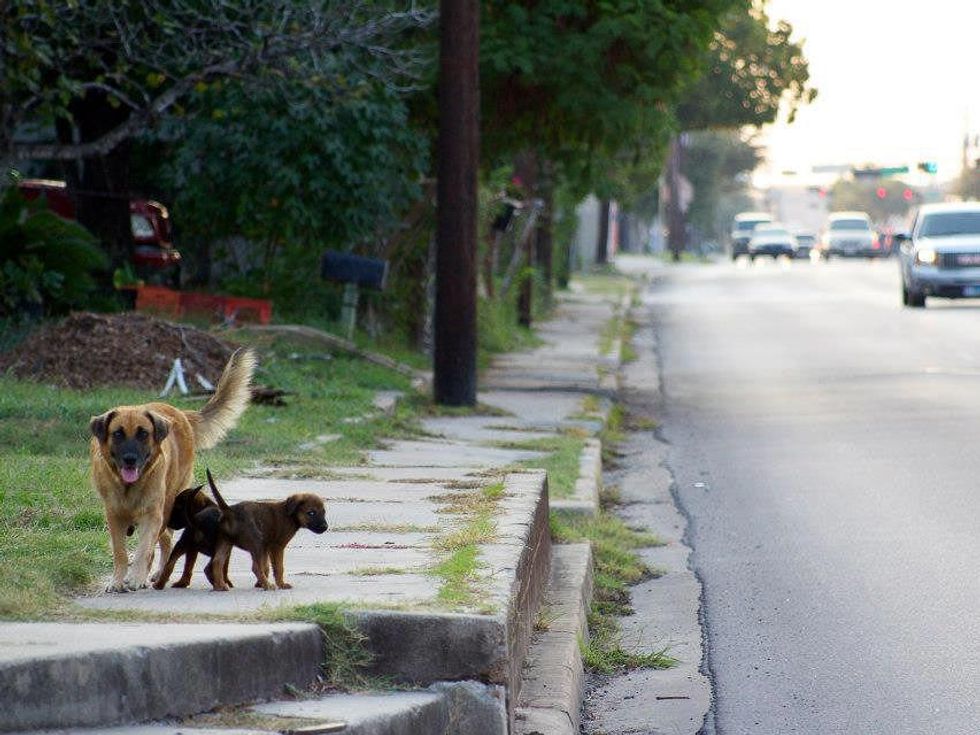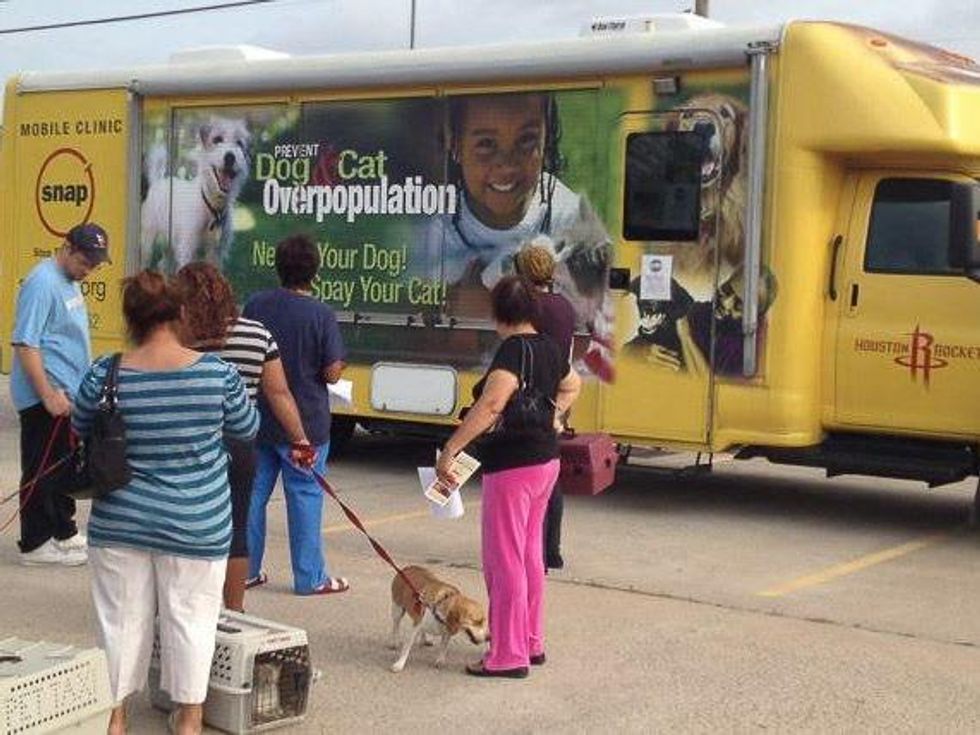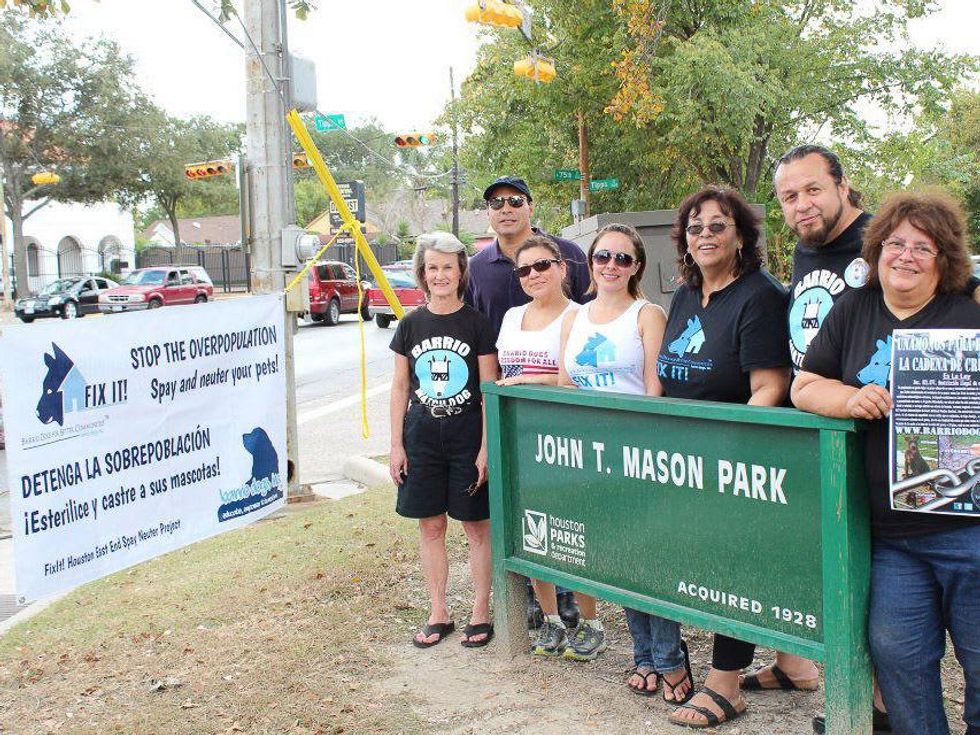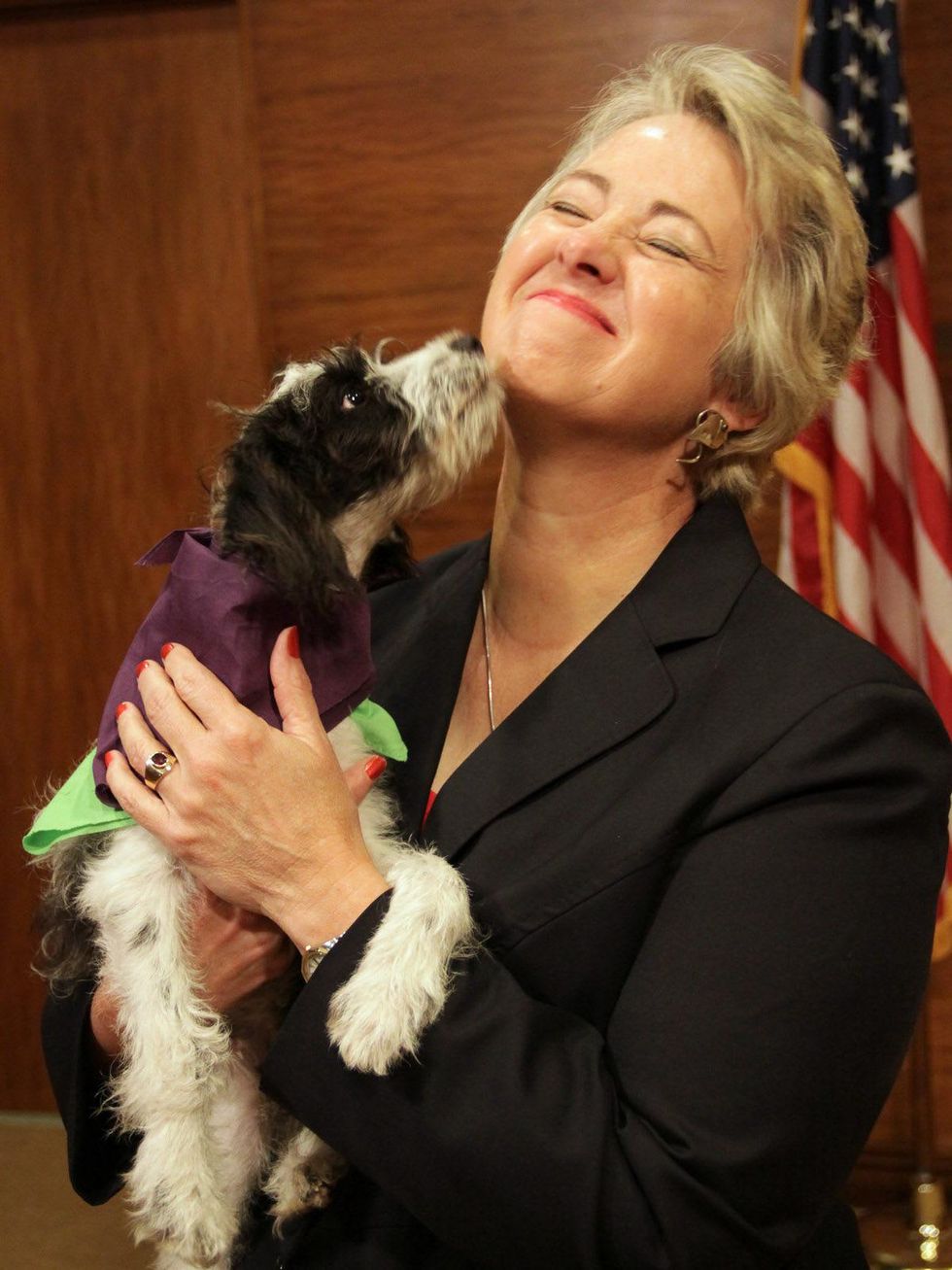Seeking "Unity for a Solution”
Don't look the other way: Houston’s homeless and abandoned animals need help now
I wasn’t even a “dog person” until my 30's, but my first “accidental” rescue, a Shepherd/Lab-mix named Lucky, changed me – for the better. For the past 15-plus years, I have aspired to be the person my dogs think I am.
I resisted becoming involved with the homeless animal issue, thinking I was too emotional about it and would want to bring them all home. I looked the other way.
I have come to realize that we have a devastating situation with stray and abandoned dogs (and cats) in Houston, growing worse by the day and yet we have no plan as a city to deal with it.
When a friend emailed about the need for dog walkers at Highland Village six years ago during a holiday adoption event promoting dogs from BARC (the city pound), I hesitated. Then the friend pointed out that really, it wasn’t about me. It was about dogs needing a potty break and couldn’t I really just focus on that aspect of things and come help out?
I relented and here I am years later, heavily involved as a volunteer in what I often describe as one of the greatest blessings and biggest challenges of my life. I sometimes have to remind myself that it still isn’t about me.
Many blessings
The blessings have come in many forms. I am inspired daily by the many efforts of selfless people I’ve come to know, especially those who have stepped up to become fosters, enabling a dog to be pulled from "death row" or taken in off the streets. This is probably the biggest need in rescue work.
I'm also moved by the many volunteers and donors who support the cause in so many ways. Knowing first-hand the many lives that have been saved through the group I came to be closely involved with (Lucky Dog Rescue) as well as many other groups I support are moments I cherish but they are short-lived because there are always more dogs in dire need of saving, every single day.
I am inspired daily by the many efforts of selfless people I’ve come to know, especially those who have stepped up to become fosters, enabling a dog to be pulled from "death row" or taken in off the streets.
I have come to realize that we have a devastating situation with stray and abandoned dogs (and cats) in Houston, growing worse by the day and yet we have no plan as a city to deal with it.
Rarely a day goes by that I am not contacted personally, or through Lucky Dog about a dog on or from the Houston streets that urgently needs a place to go. Unless the finder or somebody else is available to foster, there are no good options.
People often think all they need to do when they find a stray dog is to contact a rescue group but the reality is these groups are dependent on fosters; they do not have shelter facilities. Rescue groups can cover vetting as long as they have funds and work to find the rescues their forever homes – and they do that as often as they possibly can. At this point many rescue groups have taken on all the dogs they can manage due to lack of funds and/or fosters or are beyond capacity with many dogs in long-term boarding.
There are also groups like Barrio Dogs, Corridor Rescue and Forgotten Dogs of the 5th Ward, working in some of the hardest hit areas of the city (which look more like third world countries in terms of the number of strays), raising funds to assist area residents with spay/neuter services and providing animal welfare education and various forms of help. Along the way they encounter hundreds of dogs in dire need of rescue. They are all completely overwhelmed.
Overwhelmed rescue organizations
Yesterday, a friend called about a little dog, who came up to him on the street the night before as he was leaving a bar in the Heights. They currently have one rescue and are fostering another one they saved from the streets who is recovering from a broken leg and surgery. They couldn’t take on another.
Animal organizations are overwhelmed. This city is overwhelmed. I have come to realize we simply cannot adopt our way out of this problem.
He had the dog scanned for a micro-chip (no chip, of course) and then went to the SPCA but they said they were full. He called Citizens for Animal Protection (CAP) and they said they had just one spot available and it would be first come, first serve. He raced over there and arrived in time to get the spot and then had to sign-off that the dog could be euthanized once surrendered to them.
With no foster available, he felt like he had no choice. People often assume the SPCA, Humane Society and CAP are “no kill” shelters, but they are not. Also, unfortunately, it is a regular occurrence at this point for the shelters we have in Houston to be “full."
The only facilities who can’t turn people away are BARC (the city shelter), and Harris County Animal Control, both of which have high kill rates, in large part because they simply don’t have the capacity to house the hundreds of animals that come into the facilities each day. They are overwhelmed. This city is overwhelmed. I have come to realize we simply cannot adopt our way out of this problem.
Unity for a Solution
Recently, the three groups I mentioned above have combined forces in a collaborative effort: “Unity for a Solution." Their mission is to urge citizens into action by copying a sample email posted on their website and sending to each of the linked email addresses of city council members and the Mayor’s office to ask for leadership on this issue, primarily via a comprehensive spay/neuter plan for Houston.
As someone who has researched the successful efforts in many other cities, I whole heartedly support this initiative and endeavor to help others understand the significance of it for everyone – not just dog lovers – but for all citizens of this city who pay taxes have a right expect accountability on this issue for fiscal reasons, if nothing else.
Considering that the city and county bear significant costs in catching, sheltering, testing and euthanizing animals, it would seem as though spay/neuter is the obvious way to go.
Considering that the city and county bear significant costs in catching, sheltering, testing and euthanizing animals, it would seem as though spay/neuter is the obvious way to go. In fact, when Annise Parker served as controller for the City of Houston in 2007, she said this: “Reducing the need for animal sheltering and control in Houston could save taxpayers much of the $15 million in taxes and private donations spent each year to operate the five major local shelters. Preventing homeless dogs and cats by spaying or neutering is not only kinder than destroying them, it’s much less expensive in the long run.”
And yet here we are, six years later waiting for now Mayor Parker to demonstrate leadership on this issue.
Though comprehensive figures from the City of Houston aren’t available, the city of Pasadena reports that it spends $160 per animal for a 3-day intake with an additional $20 for each subsequent day plus an additional cost of $100 for each animal to be euthanized and disposed of. An estimated 80,000 dogs and cats are euthanized and end up in landfills each year in the greater Houston area – most through city and county facilities.
Consider the numbers. Given consideration of the costs — never mind the impact of that many decomposing bodies in area landfills — besides being the humane thing to do, sterilization is also a cost-effective mechanism that would have a positive environmental impact as well.
The city must also deal with nuisance calls dealing with strays and dog bites. In fact, 80 percent of all dog bites involved unneutered male dogs and unspayed females attract free-roaming males, which increases bite risk to people through increased exposure to unfamiliar dogs.
Stray animals are known to cause traffic accidents and can create unhealthy situations at parks and other outdoor areas, which is happening in many areas of Houston. I recently learned of a 2010 “Health of Houston” survey by the University of Texas School of Public Health, which found that stray animals are a major neighborhood concern for 61% of East End residents (crime was a distant second with 33% choosing it as their biggest concern).
Lack of funds
There are long-term plans in the works for a new city shelter but no real expansion in terms of spay/neuter services, which is a concern to many of the volunteers like myself who are committed to solving the problem. Why not use the funds for a new facility towards spay/neuter vouchers through area vets or expand services with SNAP (Spay/Neuter Assistance Program) instead? While BARC struggles to adopt out more animals, euthanization rates remain virtually the same year after year because the intake numbers continue to increase. This is not rocket science. We must reduce intake.
Approximately 2,000 pet owners who were seeking assistance with the mobile unit in 2011 were turned away due to a lack of funds and availability.
SNAP has a mobile unit that goes into low-income neighborhoods to provide spay/neuter services through private donations as well as very limited funding from the city. 5,000 sterilizations were accomplished via the mobile unit in 2012 for a total of 25,000 sterilizations overall including services provided at the SNAP Wellness Clinic on Durham.
To demonstrate the urgent unmet need, approximately 2,000 pet owners who were seeking assistance with the mobile unit in 2011 were turned away due to a lack of funds and availability, according to Laura Welch of SNAP. The need is simply greater than what can be provided with current funding.
And so at the end of each day, I am grateful for the animals we are able to save and for increased awareness on this issue. As a native Houstonian, I have always been proud of the entrepreneurial spirit of our city and this issue begs for that spirit to be put into action. The fact that we rank amongst the worst cities in the nation in terms of the number of animals we kill versus the number we spay/neuter is unacceptable. We are a better city than this.
I look forward to the day when rescue groups are “put out of business” by the efforts of dedicated citizens, and city leaders, who I implore to do the right thing. You can be a part of it by supporting Unity for a Solution and by your support of the many local rescue groups who are in dire need of volunteers, donations and fosters.
Like me, you will be glad you became involved.








